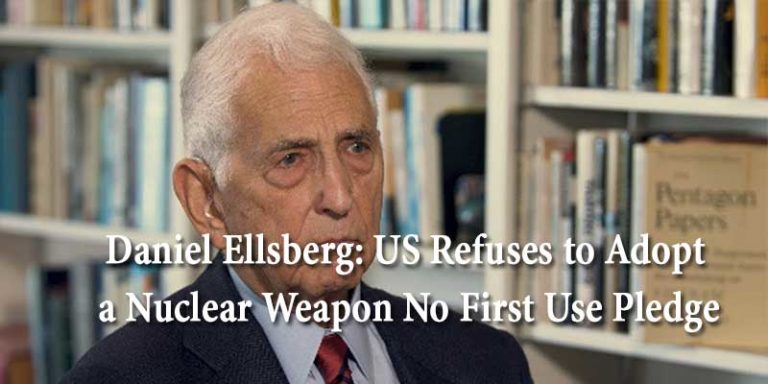
Democrats Reintroduce Bill to Block US From Using Nuclear Weapons First
Dave DeCamp / AntiWar.com
(April 16, 2021) — A pair of Democratic lawmakers in the House and the Senate reintroduced a bill on Friday that would prohibit the US from using nuclear weapons first. The legislation was introduced by Senator Elizabeth Warren (D-MA) and Rep. Adam Smith (D-WA).
The bill reads: “It is the policy of the United States to not use nuclear weapons first.” The legislation will be reviewed by the foreign affairs committees of each chamber of Congress.
A no first use bill was introduced by Smith and Warren in 2019, but it didn’t go anywhere since there is overwhelming bipartisan support for the US to have the ability to attack a country with nuclear weapons. Currently, the only nuclear powers that have a no first use policy are China and India.

China and India Are the Only Nuclear Powers with a No-First-Use Policy
“Threatening to use nuclear weapons first makes America less safe because it increases the chances of a miscalculation or an accident,” Warren said in a statement. “There are no winners in a nuclear war, and the US should never start one.”
“The United States should never initiate a nuclear war,” Smith said in a statement on the bill. “This bill would strengthen deterrence while reducing the chance of nuclear use due to miscalculation or misunderstanding.”
US Lawmakers Introduce Bill to Stop Saudi Arabia from Obtaining Nuclear Weapons

WASHINGTON (April 16, 2021) — A group of US lawmakers have introduced legislation that seeks to stop the possibility of Saudi Arabia obtaining a nuclear weapon, after reports surfaced last year that China had secretly assisted Riyadh to expand its nuclear programme.
The bill, titled, The Saudi WMD Act, aims to “take steps to impede access to sensitive technologies that could pave the way to Saudi Arabia acquiring a nuclear weapon”, according to a press release announcing the legislation on Thursday.
It was introduced in the Senate by senators Ed Markey and Jeff Merkley, and introduced in the House of Representatives by congressmen Ted Lieu and Joaquin Castro.
“Nuclear weapons in the hands of terrorists and rogue regimes is one of the gravest threats to the security of the American people and to our partners around the world,” Merkley said in a statement.
“If Saudi Arabia is working to undermine the global nonproliferation and arms control regime, with the help of China or anybody else, the US must respond.”
Markey said the bill “requires greater transparency into Saudi Arabia’s efforts to build out a ballistic missile and civilian nuclear program”.
If passed, the measure would require the Biden administration to determine whether any foreign person or country has transferred or exported to Saudi Arabia a Category One item under the Missile Technology Control Regime(MTCR), an informal political understanding that aims to limit the amount of missile proliferation worldwide.
A Category One item would include unmanned aerial vehicle systems such as ballistic missiles, cruise missiles, and target drones that are capable of delivering a payload of at least 500kg to a range of at least 300km.
If such an entity is found, the bill would require the White House to sanction them.
The bill would also terminate “most US arms sales to Saudi Arabia”, if it was found that the kingdom received help in building a nuclear fuel cycle facility not under the standards set by the International Atomic Energy Agency (IAEA).
Saudi Arabia has not signed up to the same restrictions to nuclear proliferation that other countries have, and the country only has a limited safeguards agreement with the IAEA.
Saudi Nuclear Projects
For years, Saudi Arabia has been trying to diversify its energy pool so that it can export more of its oil, rather than selling it domestically at subsidised prices.
Riyadh inked deals with Beijing in 2012 and 2017 for cooperation on a number of nuclear energy projects, and the kingdom has been working on its first two commercial nuclear reactors that will total 2.8 gigawatts.
The increasing nuclear partnerships between the two countries have been a cause of concern for the US. And last August, American intelligence agencies had been assessing reports that China is secretly helping Saudi Arabia expand its nuclear programme.
The agencies analysed suspected collaboration between the two countries at an undeclared site in the kingdom, close to a solar-panel production area.
The Wall Street Journal also reported last summer that another undisclosed site in the country’s northwest was being used to extract uranium yellowcake from uranium ore – a further step towards the development of nuclear fuel that could put the kingdom on a path to developing nuclear weapons.
A month later, The Guardian reported that Saudi Arabia likely has enough mineable uranium ore reserves to pave the way for the domestic production of nuclear fuel, citing a confidential report by Chinese geologists.
In 2018, Saudi Crown Prince Mohammed bin Salman said that the country has no plans to pursue a nuclear bomb, but if Iran were to develop one, then it would follow suit “as soon as possible”.
Under the previous Donald Trump administration, the US had given several authorisations to American companies to share sensitive nuclear power information.
Posted in accordance with Title 17, Section 107, US Code, for noncommercial, educational purposes.